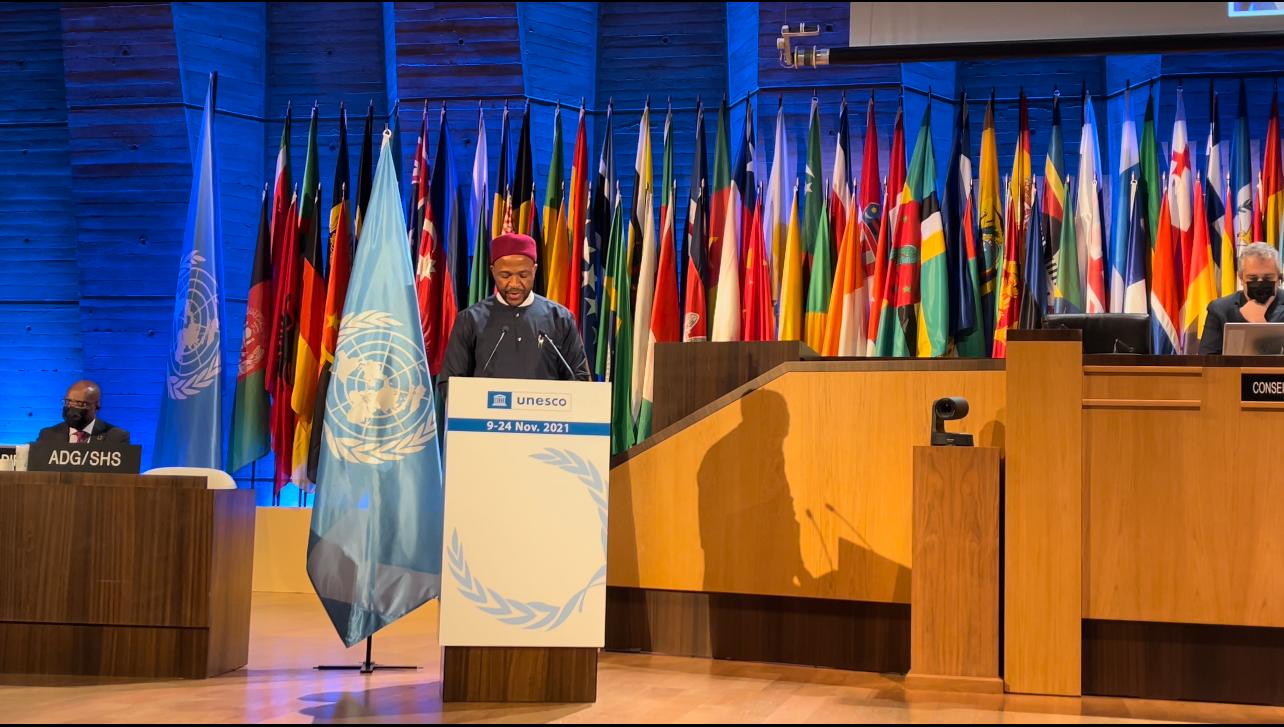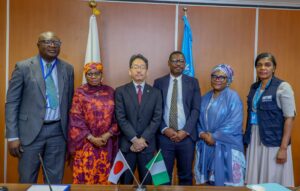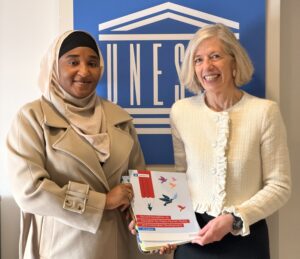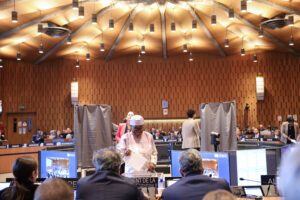
Mr. President of the General Conference,
Chairperson of the Executive Board,
Madam Director-General,
Honourable Ministers and distinguished Delegates,
Excellencies, Ladies and Gentlemen,
Warm greetings from the people and government of the Federal Republic of Nigeria, and our President Mohammadu Buhari.
Congratulations to our new President of the Conference, the outgoing President, and the re-elected Director-General.
Excellencies,
The COVID-19 pandemic caused significant alterations to the way we conduct business, exposing our fragility against uncertainties. Yet, our response has been a testimony to the human resilience to rise to its challenges; adapting and innovating to advance global governance.
Nigeria therefore commends UNESCO’s efforts in addressing the effects of the pandemic and other development issues that have further been aggravated by the crisis.
Much however remains to be done!
On our part, with a near 70% youth population, Nigeria is braced to address gaps evident in under and un-employment, as well as other socio-economic lapses, by instituting sustainable programmes within UNESCO’s mandate, as follows:
- In education, we note the increased availability of UNESCO’s resources to the African region, and decentralization as it affects the Sector.
- As the only E9 country in Sub-Saharan Africa, we will ensure full complementation of education-related policies – paying close attention to performance indicators and output results.
- We are reforming the teaching profession by increasing the service year from 35 to 40 years; moving the retirement age from 60 to 65 years; as well as providing better remunerations to increase teachers’ motivation. This is aimed to attract and retain the best hands in the sector.
- Nigeria recently hosted an International Conference on the Safe School Declaration, aimed to advance the Safe School Initiative, galvanize support and review progress in achieving the commitments of the Declaration.
- Our government is also sustaining the National Homegrown School Feeding Programme; the Better Education Service Delivery for All (BESDA); and other programmes that target Out of School Children. We have adopted Open, Distance and Flexible E-learning systems, STEM Education, Inclusive education for the challenged, and the Nigeria Skills Qualification Framework (NSQF).
- On Culture, our Cultural Policy is being reviewed to improve actions that align the policy with the 2030 Sustainable Development Agenda.
- We are addressing the impact of climate change on cultural biodiversity and cultural heritage by integrating culture in the climate change agenda. Our interest in the Lake Chad and request to UNESCO for the revitalization of the Lake, for the common use of the Sahel regions, as well as the just concluded UNESCO-BIOPALT Project, remains pertinent.
- Nigeria is nominating viable cities into the Creative Cities Network. This agrees with UNESCO’S Programmes building on the mechanism of Creative Cities to promote inclusive and participatory urban development and local creative economies, targeting women and youth.
- In the Natural Sciences, Nigeria appreciates UNESCO’s partnership in establishing an Ecohydrology Centre at the Jabi Lake in Abuja. First of its kind in West Africa, when established, we count on your continued cooperation to make the project a reality.
- Efforts to address climate change adaptation and climate extremes informed our development of seasonal climate prediction and annual flood outlook as Early Warning System. At the COP 26 in Glasgow, Nigeria took further engagement to infuse climate change education in the school curriculum.
- We are working with Intergovernmental Oceanographic Commission (IOC) to initiate national capacity programme for ocean literacy.
- We have established National Water Resources Capacity Building Study Centres in the 6 Geopolitical Zones, to advance knowledge of Integrated Water Resources Management.
- Nigeria hosted the 33rd Session of the International Coordinating Council of the UNESCO Man and the Biosphere Programme last September. We appreciate the Director-General for personally participating, and her bilateral meeting with the President. We shall continue to support initiatives on the environment; and count on UNESCO to sustain the project “AFRIBIOFUND” and intensify action for a partnership with the African Development Bank.
- Government’s policies and programmes to overcome poverty, illiteracy and ignorance are mostly targeted at improving the living conditions of the marginalized in the society. Opportunities in the Draft Programme and Budget for the Social and Human Sciences Sector (SHS) will, no doubt, impact our action and assist our targets to reduce the impact of the pandemic and achieve the SDGs.
We shall continue to pursue good governance, equality, respect for human rights, rule of law, transparency and accountability.
- In the Communication and Information Sector, Nigeria is developing its National Digital Economy Policy.
- We are engaging social media platforms for a common code of conduct that will reduce the incidence of fake news and hate speech; and look forward to hosting the 2022 UNESCO Media and Information Literacy Week. We aim to increase the ease and speed of broadband access of National Broadband Plan, while reducing the cost by 51.28%.
- The Draft Programme and Budget document before us Medium-Term Strategy are a comprehensive proposal, developed out of an inclusive process. Nigeria looks forward to their adoption. We appreciate efforts to re-conceptualize the Global Priority Africa and the continued effort of the Secretariat to engage Member States in this regard.
In conclusion, Nigeria remains committed to UNESCO’s programme and policies to achieve the SDGs and other Global Agenda for Sustainable Development. The present reality is indeed a pointer to our vulnerability to unforeseen occurrences and the need to reinforce our beliefs in solidarity despite our differences. Truly, “if we consider our differences as beautiful as the rainbow, then we can work together in harmony” to save the present and future of our planet. This should start from our joint agreements at this UNESCO forum.
I thank you all for your attention.




